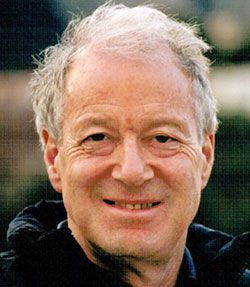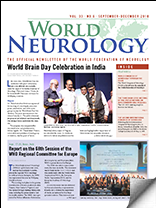Founding Father of Dutch Neuro-Oncology
By Martin J.B. Taphoorn and Martin J. van den Bent
On July 3, Dr. Charles Vecht, neurologist and neuro-oncologist, passed away at home in Amsterdam at the age of 71, having suffered from a progressive auto-immune disorder over the past years. He is survived by his wife Roselien, their two sons, and grandchildren.

Early after his training as neurologist in Groningen and Amsterdam, and having already succesfully defended his PhD thesis “Haemostasis in Acute Neurological Disorders” during his residency in 1975 at Groningen University, Charles decided to devote his career to neuro-oncology. As the first Dutch neuro-oncologist, he successfully applied for a fellowship at the Memorial Sloan-Kettering Cancer Center in New York City under the supervision of Dr. Jerome Posner.
Returning to the Netherlands, he started a multidisciplinary neuro-oncology clinic in Rotterdam (Dr. Daniel den Hoed Clinic) with the neurologist as the coordinator, similar to the New York City model. With his characteristic enthusiasm and drive, he motivated several Dutch neuro-oncologists to be trained in New York City as well.
In 1992, he was among the founding members of the Dutch Neuro-Oncology Working Group. His research activities were initially focused on neurological complications in cancer, initiating groundbreaking multicenter clinical trials on treatment of single brain metastasis, and optimal dosage of dexamethasone in brain and spinal metastases. His ever-lasting energy and continuous creative ideas secured a prominent role in European Neuro-Oncology as well, with a major participation in the EORTC Brain Tumor Group, which he chaired.
Moving from Rotterdam to The Hague during that time, he created another multidisciplinary neuro-oncology team in Haaglanden Medical Center, including one of the first nursing specialists in the team. His research shifted to gliomas, and specifically epilepsy in brain tumor patients. As head of the residency program in The Hague, he motivated several residents to start clinical research in neuro-oncology, and to write publications under his supervision. Apart from being encouraging, he was also demanding for his residents, but not less for himself.
At his official retirement in The Hague, he was knighted by the mayor of The Hague for all of his activities in neuro-oncology, nationally and internationally. Charles, however, did not really accept his compulsary retirement, and from 2012, he worked with his friend and colleague Dr. Jean-Yves Delattre at the Department of Neuro-Oncology of the Pitié-Salpétrière Hospital in Paris, France. He continued his clinical research on epilepsy in brain tumor patients until his disease stopped him from doing so.
We have worked with Charles for many years, in Rotterdam, and in The Hague, respectively. The last time we met him as former colleagues was during the 25th anniversary of the Dutch Neuro-Oncology Working Group in late 2017. During that occasion, he was elected as honorary member and held a festive speech, highlighting the impressive achievements in neuro-oncology over the past 25 years. We respectfully remember Charles, above all, for what he accomplished for us, and for neuro-oncology, both in The Netherlands and abroad. We have lost a remarkable and outstanding colleague and friend, but the inspiration remains. •
